
Knight at the Movies Archives
Ang Lee's endearing comedy, Spike Lee's captures a Broadway rock musical/hybrid
Aging hippies and rock music enthusiasts may go to Ang Lee’s new movie Taking Woodstock hoping to trip out on footage from
the fest’s legendary music performances. But Lee’s new movie is only about the festival in a peripheral sense and doesn’t contain
any of the legendary performances by Jimi Hendrix, The Who, Joe Cocker, and the rest. It doesn’t need them – and if the music
lovers give the film a chance they’ll surely fall under its sweetly comedic spell.
Working again with screenwriter James Schamus and a new cinematographer (Eric Gautier, responsible for the breathtaking Into the
Wild), Lee returns to his favorite theme: the desire of a repressed Everyman to break out; to stand societal conventions on its head
and the sweet bliss that happens when he finally does. In this case, his leading character, Elliot Teichberg (played with equal parts
equanimity and sly winsomeness by hot young comedian Demetri Martin in his first starring role) just happens to be gay and there is
a beautiful symmetry between Elliot’s personal coming out and the cultural coming out that was happening for young America that
Woodstock came to represent.
It’s the spirit of the festival and its message, not the music that Lee is interested in portraying. It’s a lovely idea and the result, in a
field crowded with sharp, aggressive, edgy comedies is something much more gentle, rounded and endearing. Yet it’s not altogether
warm and fuzzy – there’s plenty of bite here and wry insight, too. The movie’s much more in line with Lee’s sharp and funny The
Wedding Banquet than his tragic love story Brokeback Mountain.
Lee’s movie is based on the memoir of Elliot Tiber – a young Jewish interior designer living in Manhattan who was saddled with the
responsibility for the upkeep of the broken down Catskills “resort” owned by his tough, shrewish mother (Imelda Staunton, who is
tremendous) and his mostly silent, put upon father (Henry Goodman, who does much with his still waters running deep part). Lee
sets the sardonic tone at the outset when he gives us a tour of the crummy motel set amidst the sleepy hamlet of upstate New York
circa summer ’69. With a few brush strokes, Lee paints a portrait of an area that is bucolic but whose people are set in their ways –
especially when it comes to that strange new breed known as hippies. Lee is aided enormously by a roster of expert supporting
actors (Emile Hirsch, Jeffrey Dean Morgan, Eugene Levy, and Bette Henritze among them) who portray the eccentric, often cranky
characters inhabiting the area.
Though young Elliot yearns for another life his overbearing, demanding mother isn’t about to cut the apron strings. Down to their
last three months from an indulgent bank officer with foreclosure in sight, Elliot, as head of the local township, seizes on the
opportunity to grant the Woodstock organizers the permit to hold their music festival and in the bargain, use the motel as the
group's headquarters, erasing his parent’s huge debt. Overcoming protests from the locals and after paying cagey land owner Max
Yasgur (Levy) $75,000 to rent his farm, a sea of humanity begins pouring into the area.
Something akin to a boom town develops and Elliot is torn between wanting to join the spirited revelry of the invading hippies and
his responsibilities. Lee captures this (and mirrors the Woodstock documentary) by utilizing split screen, judicious use of a sea of
extras and computer effects to create the masses. Elliot’s warring desires are immediately apparent to Vilma, a militant,
unapologetic drag queen with a lot of insight (hilariously played by Liev Schreiber in a standout performance) who shows up and
takes on the job of security for the overrun motel. Vilma knows that Elliot is gay, indeed, was present at the Stonewall riot, and that
he’s dying to act on his desire for a hot construction worker he’s met (the two have bonded over a Judy Garland record).
One night in the crowded bar, in the midst of a festive bacchanalia, a comely young lass kisses Elliot, who then turns and kisses the
construction worker to a roar of approval from the crowd. Though we later glimpse the two in bed it’s apparent that he’s still torn –
not so much by his sexuality but by his desire to be his own person. Vilma advises Elliot to give himself permission to burst open
the closet door on both his sexuality and convention – “I know who I am. That makes it easier for everyone else doesn’t it?” which
helps but it is his father, urging him to experience the festival first hand, that finally convinces Elliot to let himself go. And does he
ever – thanks to a couple of free lovin’ hippies (Paul Dano and Kelli Garner) who invite him into their van to trip and make love.
Eventually, the blissful, infectious “it’s all good” mentality that Woodstock embodied even gets to his hateful mother who temporarily
gets into the spirit of things (thanks to a batch of hash brownies).
The message of the festival and the era looks prescient in retrospect – this “make love, not war” mentality was a call to arms – not
just to straight America but to gay Americans and everyone else, too. The idea of everyone coming out and acting on their true
desires, following their dreams must have been utterly intoxicating And Lee’s film joyfully manages to capture this small moment in
cultural history in all its feel good glory. Taking Woodstock is great fun. In many ways it’s like the ultimate coming out story – what a
glorious weekend that must have been!
+++++++++++++++++++++++++++++++++++++++++++++++++++++++++++++++++++++++++++++++++++++++++++++
It’s not really surprising that Spike Lee, after seeing the mesmerizing Broadway rock musical Passing Strange, powered by the
creative talents of musician-songwriter-performer Stew, the musical’s subject, narrator and central focus, would want to film it. Stew’s
story – a tale of a black man growing up in the 70s in Los Angeles with a yearning to break the bonds of a stifling mother and his
middle class upbringing who is inspired by a closeted homosexual choir director to strike out for Amsterdam and Berlin, there to find
all manner of adventures on his journey of self-discovery a “quest for the real” – is an offbeat doozey. And the musical’s staging –
with the musicians right onstage with Stew presiding over them – and a quartet of amazingly versatile musical actors enacting Stew’s
tale – is simply but powerfully presented (it’s really both musical and rock concert in one). Lee filmed the last two performances of
the musical (which won the 2008 Tony for Best Book of a Musical) in front of the audience and then another performance so his
cameras could come in close and catch intimate and glorious moments alike (we also see some backstage activity). The result is a
rousing, emotional roller coaster that’s a must see not just for fans of rock musicals but those with an eye (and an ear) for
something unusual – compellingly so. Passing Strange the Movie is available on demand from a variety of cable systems.
the fest’s legendary music performances. But Lee’s new movie is only about the festival in a peripheral sense and doesn’t contain
any of the legendary performances by Jimi Hendrix, The Who, Joe Cocker, and the rest. It doesn’t need them – and if the music
lovers give the film a chance they’ll surely fall under its sweetly comedic spell.
Working again with screenwriter James Schamus and a new cinematographer (Eric Gautier, responsible for the breathtaking Into the
Wild), Lee returns to his favorite theme: the desire of a repressed Everyman to break out; to stand societal conventions on its head
and the sweet bliss that happens when he finally does. In this case, his leading character, Elliot Teichberg (played with equal parts
equanimity and sly winsomeness by hot young comedian Demetri Martin in his first starring role) just happens to be gay and there is
a beautiful symmetry between Elliot’s personal coming out and the cultural coming out that was happening for young America that
Woodstock came to represent.
It’s the spirit of the festival and its message, not the music that Lee is interested in portraying. It’s a lovely idea and the result, in a
field crowded with sharp, aggressive, edgy comedies is something much more gentle, rounded and endearing. Yet it’s not altogether
warm and fuzzy – there’s plenty of bite here and wry insight, too. The movie’s much more in line with Lee’s sharp and funny The
Wedding Banquet than his tragic love story Brokeback Mountain.
Lee’s movie is based on the memoir of Elliot Tiber – a young Jewish interior designer living in Manhattan who was saddled with the
responsibility for the upkeep of the broken down Catskills “resort” owned by his tough, shrewish mother (Imelda Staunton, who is
tremendous) and his mostly silent, put upon father (Henry Goodman, who does much with his still waters running deep part). Lee
sets the sardonic tone at the outset when he gives us a tour of the crummy motel set amidst the sleepy hamlet of upstate New York
circa summer ’69. With a few brush strokes, Lee paints a portrait of an area that is bucolic but whose people are set in their ways –
especially when it comes to that strange new breed known as hippies. Lee is aided enormously by a roster of expert supporting
actors (Emile Hirsch, Jeffrey Dean Morgan, Eugene Levy, and Bette Henritze among them) who portray the eccentric, often cranky
characters inhabiting the area.
Though young Elliot yearns for another life his overbearing, demanding mother isn’t about to cut the apron strings. Down to their
last three months from an indulgent bank officer with foreclosure in sight, Elliot, as head of the local township, seizes on the
opportunity to grant the Woodstock organizers the permit to hold their music festival and in the bargain, use the motel as the
group's headquarters, erasing his parent’s huge debt. Overcoming protests from the locals and after paying cagey land owner Max
Yasgur (Levy) $75,000 to rent his farm, a sea of humanity begins pouring into the area.
Something akin to a boom town develops and Elliot is torn between wanting to join the spirited revelry of the invading hippies and
his responsibilities. Lee captures this (and mirrors the Woodstock documentary) by utilizing split screen, judicious use of a sea of
extras and computer effects to create the masses. Elliot’s warring desires are immediately apparent to Vilma, a militant,
unapologetic drag queen with a lot of insight (hilariously played by Liev Schreiber in a standout performance) who shows up and
takes on the job of security for the overrun motel. Vilma knows that Elliot is gay, indeed, was present at the Stonewall riot, and that
he’s dying to act on his desire for a hot construction worker he’s met (the two have bonded over a Judy Garland record).
One night in the crowded bar, in the midst of a festive bacchanalia, a comely young lass kisses Elliot, who then turns and kisses the
construction worker to a roar of approval from the crowd. Though we later glimpse the two in bed it’s apparent that he’s still torn –
not so much by his sexuality but by his desire to be his own person. Vilma advises Elliot to give himself permission to burst open
the closet door on both his sexuality and convention – “I know who I am. That makes it easier for everyone else doesn’t it?” which
helps but it is his father, urging him to experience the festival first hand, that finally convinces Elliot to let himself go. And does he
ever – thanks to a couple of free lovin’ hippies (Paul Dano and Kelli Garner) who invite him into their van to trip and make love.
Eventually, the blissful, infectious “it’s all good” mentality that Woodstock embodied even gets to his hateful mother who temporarily
gets into the spirit of things (thanks to a batch of hash brownies).
The message of the festival and the era looks prescient in retrospect – this “make love, not war” mentality was a call to arms – not
just to straight America but to gay Americans and everyone else, too. The idea of everyone coming out and acting on their true
desires, following their dreams must have been utterly intoxicating And Lee’s film joyfully manages to capture this small moment in
cultural history in all its feel good glory. Taking Woodstock is great fun. In many ways it’s like the ultimate coming out story – what a
glorious weekend that must have been!
+++++++++++++++++++++++++++++++++++++++++++++++++++++++++++++++++++++++++++++++++++++++++++++
It’s not really surprising that Spike Lee, after seeing the mesmerizing Broadway rock musical Passing Strange, powered by the
creative talents of musician-songwriter-performer Stew, the musical’s subject, narrator and central focus, would want to film it. Stew’s
story – a tale of a black man growing up in the 70s in Los Angeles with a yearning to break the bonds of a stifling mother and his
middle class upbringing who is inspired by a closeted homosexual choir director to strike out for Amsterdam and Berlin, there to find
all manner of adventures on his journey of self-discovery a “quest for the real” – is an offbeat doozey. And the musical’s staging –
with the musicians right onstage with Stew presiding over them – and a quartet of amazingly versatile musical actors enacting Stew’s
tale – is simply but powerfully presented (it’s really both musical and rock concert in one). Lee filmed the last two performances of
the musical (which won the 2008 Tony for Best Book of a Musical) in front of the audience and then another performance so his
cameras could come in close and catch intimate and glorious moments alike (we also see some backstage activity). The result is a
rousing, emotional roller coaster that’s a must see not just for fans of rock musicals but those with an eye (and an ear) for
something unusual – compellingly so. Passing Strange the Movie is available on demand from a variety of cable systems.
Coming Out:
Taking Woodstock-Passing Strange
Expanded Edition of 8-26-09 Windy City Times KATM Column
By Richard Knight, Jr.
Taking Woodstock-Passing Strange
Expanded Edition of 8-26-09 Windy City Times KATM Column
By Richard Knight, Jr.
CHECK OUT OTHER KATM FILM REVIEWS IN THE ARCHIVES


